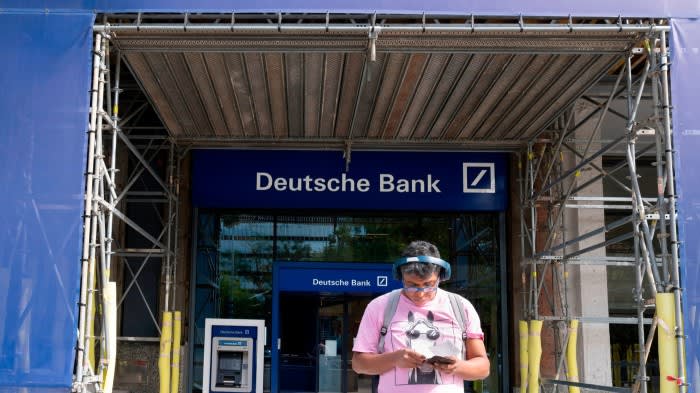Unlock the Editor’s Digest for free
Roula Khalaf, editor of the FT, selects her favorite stories in this weekly newsletter.
Deutsche Bank has cut spending on external consultants at its private bank by 70 percent as the division tries to become more profitable after a badly failed IT project last year.
Under the private bank’s new head, Claudio de Sanctis, who replaced Karl von Rohr a year ago, the division has drastically cut back on external consultants and ended projects involving the Boston Consulting Group (BCG) and other professional services firms, according to people familiar with the details. The people added that the unit had cut spending on consultants by a double-digit million euros.
“Working with external consultants can be seen as an easy way out,” De Sanctis told the Financial Times: “If you have a problem, call a consultant who will solve it for you.”
“We have to contribute our expert knowledge. . . to solve our recurring problems ourselves,” he said, adding that the lower consultancy budgets were here to stay.
Deutsche’s private bank has long struggled with high costs and weak profitability. Although it generated 33 percent of the lender’s revenue in 2023, it was only responsible for 19 percent of pre-tax profits.
In recent years, every euro of income that the private bank generates has entailed approximately 80 cents in costs. In early 2022, Von Rohr promised to reduce this to between 60 and 65 cents by 2025, but at the end of last year the cost-to-income ratio remained at 81 percent.
The private bank employs 38,000 of Deutsche’s 90,000 employees and is responsible for Germany’s retail banking activities, including the Postbank brand, and asset management.
The division has a history of relying on external advice, with Bain & Company masterminding a restructuring of its retail banking business in 2017 and BCG recently playing a leading role in an effort to develop a digital investment platform for retail clients. That project, codenamed Vestivity, was launched under von Rohr but scrapped this year by the Sanctis. BCG declined to comment.
At the end of 2023, De Sanctis stepped up cost savings with a plan to close as many as 250 of the 550 remaining Postbank branches.
This year, the lender reached an agreement on the closure of branches with the powerful German service sector union Verdi. “The benefits of structural cost savings will become visible from 2025,” De Sanctis told the FT. “This should bring our cost-to-income ratio to a level that allows us to reinvest more incremental savings, including in our asset management activities.”
He noted that his division’s cost-to-revenue ratio fell 1.4 percentage points year-over-year in the first quarter of 2024, partly due to lower spending on consultants and travel.
“In the first quarter we achieved results on the cost side, which is great, especially given the enormous inflationary pressures,” he said. Revenues at the private bank fell by 2 percent year-on-year between January and March, while costs fell by 4 percent.
The failed migration of 12 million Postbank customers to Deutsche’s IT systems last summer was costly and embarrassing. The bank initially claimed that the project was successful. However, thousands of customers were locked out of their accounts for weeks and customer service centers were overwhelmed.
The problems resulted in more than €100 million in additional costs for Deutsche. The bank was also publicly reprimanded by financial regulator BaFin, which sent a special monitor.
“We believe that under the private bank’s new management there will be a cultural change and more attention will be paid to improving the company’s returns,” JPMorgan analyst Kian Abouhossein wrote in a note on Deutsche this month . He added that rising profits in retail banking and asset management would make the bank less vulnerable to unpredictable investment banking income.
